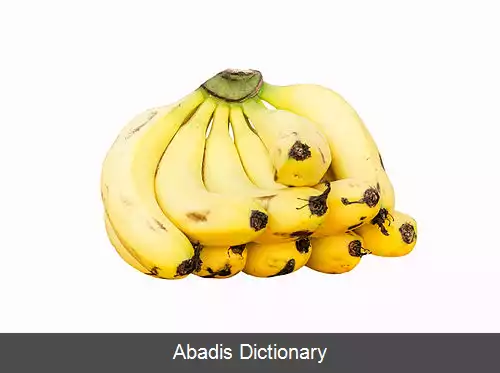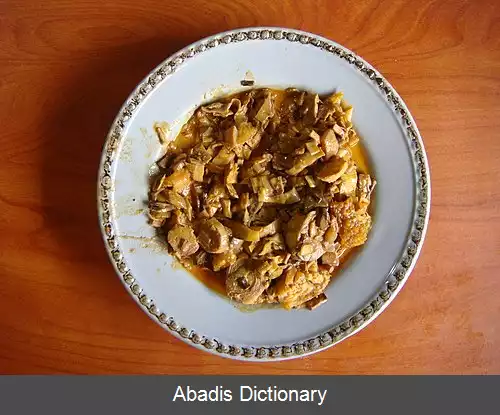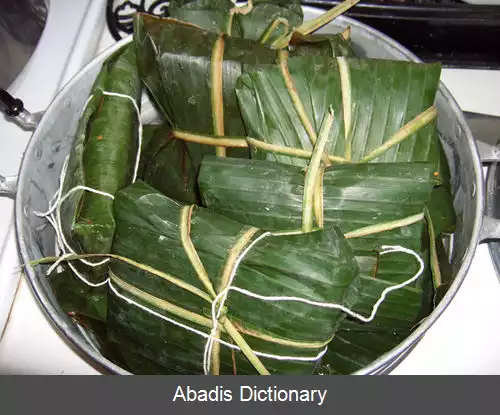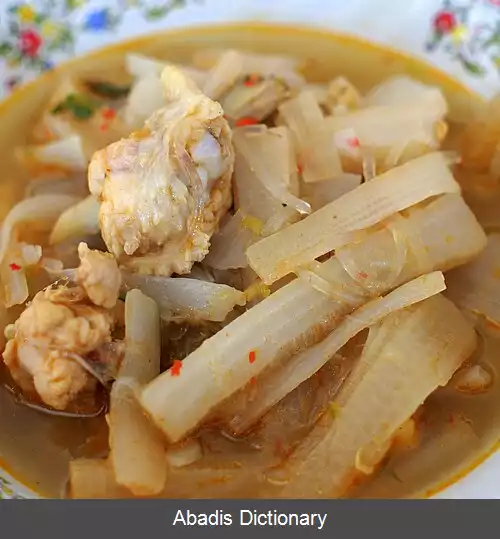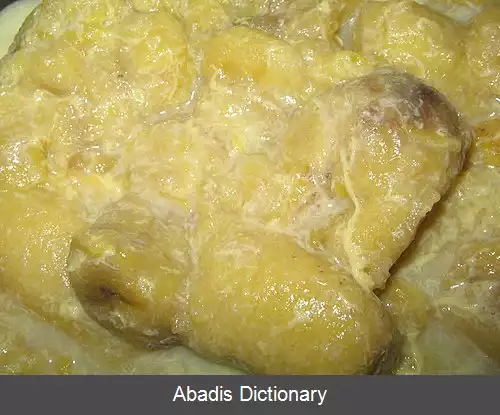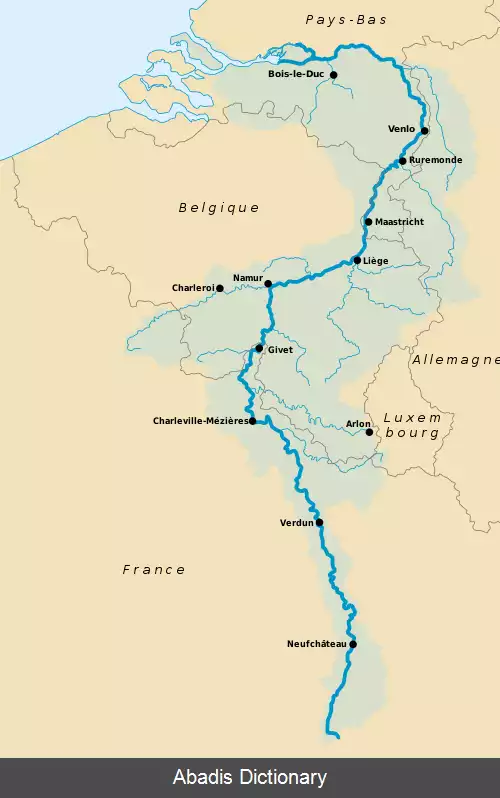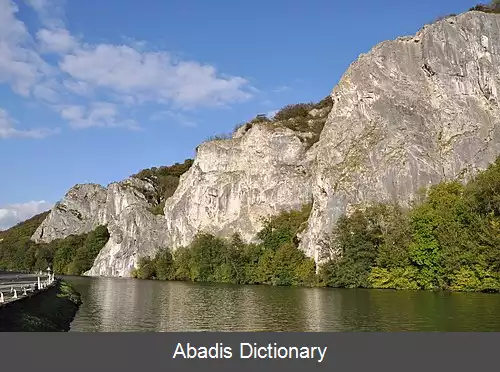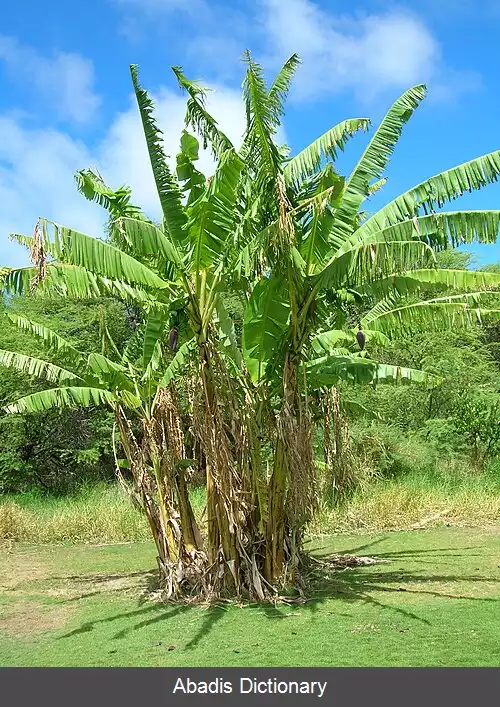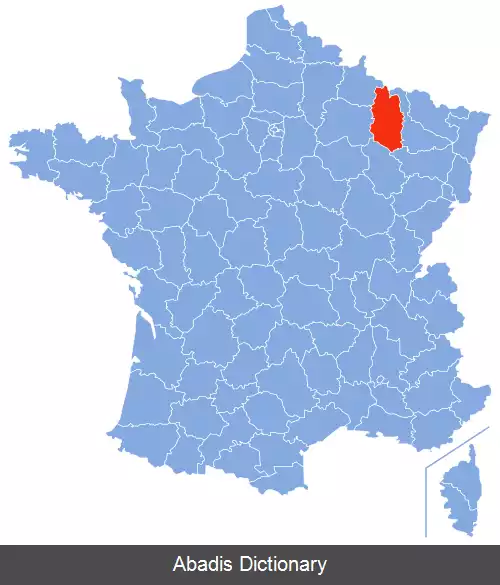از واژه فارسی میانه ( پهلوی یا اشکانی ) mōz وام گرفته شده است که به همین معنی است. این کلمه از کلمه سانسکریت"موچا" گرفته شده است که به همین معنی است.
کلمات مشابه
WiktionarySearchموز
Entry Discussion CitationsLanguageDownload PDFWatchEditSee also: مور
ArabiceditEtymologyeditBorrowed from Middle Persian 𐭬 𐭅 𐭆 ( mwc /mōz/ ) , from Sanskrit मोच ( moca ) , then, according to Roger Blench, via Dravidian ( compare Tamil மோத்தை ( mōttai, “banana flower” ) from Malayo - Polynesian ( compare Dobel muɁu, Manggarai muku ) from Trans - New Guinea ( compare Fataluku muɁu, Mosimo mugu ) , ultimately from Proto - Trans - New Guinea *mugu. [1]
... [مشاهده متن کامل]
Pronunciation
edit
IPA ( key ) : /mawz/
Noun
edit
مَوْز • ( mawz ) m ( collective, singulative مَوْزَة f ( mawza ) )
banana
Declension
edit
Declension of noun مَوْز ( mawz )
Descendants
edit
Hijazi Arabic: موز ( mōz )
→ Amharic: ሙዝ ( muz )
→ Baiso: muze
→ Kachama - Ganjule: muz, muze
→ Sidamo: muuze
→ Middle Armenian: մոզ ( moz )
→ Ge'ez: ሙዝ ( muz )
→ Harari: ሙዝ ( mūz )
→ Hebrew: מוז ( moz )
→ Ottoman Turkish: موز ( mevz, muz )
Turkish: muz
→ Classical Persian: مَوْز ( mawz )
Iranian Persian: مُوز ( mowz )
→ Swahili: mazu
→ Tigre: ሙዝ ( muz )
→ Tigrinya: ሙዝ ( muz )
References
edit
^ Blench, Roger ( 2016 ) “Things your classics master never told you: a borrowing from Trans New Guinea languages into Latin”, in Academia. edu[1], Academia, Inc.
MacKenzie, D. N. ( 1971 ) “mōz”, in A concise Pahlavi dictionary, London, New York, Toronto: Oxford University Press
Chagatai
edit
Etymology
edit
From Proto - Turkic *būŕ.
Noun
edit
موز ( muz ) ( plural موزلار )
ice
Descendants
edit
Uyghur: مۇز ( muz )
Uzbek: muz
Hijazi Arabic
edit
Etymology
edit
From Arabic مَوْز ( mawz ) .
Pronunciation
edit
IPA ( key ) : /moːz/, [mo̞ːz]
Noun
edit
موز • ( mōz ) m ( collective, singulative موزة f ( mōza ) , plural موزات ( mōzāt ) )
( collective ) banana
Ottoman Turkish
edit
Etymology
edit
Borrowed from Arabic مَوْز ( mawz ) .
Pronunciation
edit
IPA ( key ) : [mɛvz], [mɛˈviz], [muz]
Noun
edit
موز • ( mevz, meviz, muz )
banana
Descendants
edit
Turkish: muz
References
edit
Redhouse, James W. ( 1890 ) “موز”, in A Turkish and English Lexicon[2], Constantinople: A. H. Boyajian, page 2028b
Persian
edit
Persian Wikipedia has an article on:
موز
Etymology
edit
Inherited from Middle Persian 𐭬 𐭅 𐭆 ( mwc /mōz/ ) , from an earlier Middle Persian mōč, from Sanskrit मोच ( moca ) , derived from Dravidian ( compare Tamil மோத்தை ( mōttai, “banana flower” ) , from Malayo - Polynesian ( see Dobel muɁu, Manggarai muku ) , from Trans - New Guinea ( see Fataluku muɁu, Mosimo mugu ) and lastly from Proto - Trans - New Guinea *mugu.
The Arsacid/Early Middle Persian consonant č when occurring after a vowel went through a lenition process resulting in z by the end of Sassanid time, because of this it is highly unlikely this word is a loanword from Arabic as what would be borrowed exactly. Although there might have been an influence in the pronunciation of aw instead of native ō.
Pronunciation
edit
( Classical Persian ) IPA ( key ) : [moːz], [mawz]
( Dari, formal ) IPA ( key ) : [moːz]
( Iran, formal ) IPA ( key ) : [mowz]
( Tajik, formal ) IPA ( key ) : [m�wz]
Readings
( dialectal, Hamadan ) IPA ( key ) : /mewz/
Noun
edit
Dari کیله
Iranian Persian مُوز
Tajik банан, мавз
موز • ( mowz ) ( plural موزها ( mowz - h� ) )
( chiefly Iran or dated ) banana
References
edit
MacKenzie, D. N. ( 1971 ) “mōz”, in A concise Pahlavi dictionary, London, New York, Toronto: Oxford University Press
Shina
edit
Etymology
edit
Inherited from Sanskrit मांस ( māṁs� ) .
Pronunciation
edit
IPA ( key ) : /moːz/
Noun
edit
موز ( moz )
meat, flesh
Further reading
edit
Turner, Ralph Lilley ( 1969–1985 ) “māṁs�”, in A Comparative Dictionary of the Indo - Aryan Languages, London: Oxford University Press
South Levantine Arabic
edit
Etymology
edit
From Arabic مَوْز ( mawz ) .
Pronunciation
edit
IPA ( key ) : /moːz/, [moːz]
Audio ( Ramallah ) :
Duration: 2 seconds. 0:02
Noun
edit
موز • ( mōz ) m ( collective, singulative موزة f ( mōze ) , paucal موزات ( mōzāt ) )
( uncountable ) bananas
Urdu
edit
Etymology
edit
Borrowed from Classical Persian مَوْز ( mawz ) , from Arabic مَوْز ( mawz ) .
Pronunciation
edit
( Standard Urdu ) IPA ( key ) : /mɔːz/
Noun
edit
مَوز • ( mauz ) m ( Hindi spelling मौज़ )
a type of banana
References
edit
“
Wiktionary
Search
موز
Entry Discussion Citations
Language
Download PDF
Watch
Edit
See also: مور
Arabic
edit
Etymology
edit
Borrowed from Middle Persian 𐭬 𐭅 𐭆 ( mwc /mōz/ ) , from Sanskrit मोच ( moca ) , then, according to Roger Blench, via Dravidian ( compare Tamil மோத்தை ( mōttai, “banana flower” ) from Malayo - Polynesian ( compare Dobel muɁu, Manggarai muku ) from Trans - New Guinea ( compare Fataluku muɁu, Mosimo mugu ) , ultimately from Proto - Trans - New Guinea *mugu. [1]
Pronunciation
edit
IPA ( key ) : /mawz/
Noun
edit
مَوْز • ( mawz ) m ( collective, singulative مَوْزَة f ( mawza ) )
banana
Declension
edit
Declension of noun مَوْز ( mawz )
Descendants
edit
Hijazi Arabic: موز ( mōz )
→ Amharic: ሙዝ ( muz )
→ Baiso: muze
→ Kachama - Ganjule: muz, muze
→ Sidamo: muuze
→ Middle Armenian: մոզ ( moz )
→ Ge'ez: ሙዝ ( muz )
→ Harari: ሙዝ ( mūz )
→ Hebrew: מוז ( moz )
→ Ottoman Turkish: موز ( mevz, muz )
Turkish: muz
→ Classical Persian: مَوْز ( mawz )
Iranian Persian: مُوز ( mowz )
→ Swahili: mazu
→ Tigre: ሙዝ ( muz )
→ Tigrinya: ሙዝ ( muz )
References
edit
^ Blench, Roger ( 2016 ) “Things your classics master never told you: a borrowing from Trans New Guinea languages into Latin”, in Academia. edu[1], Academia, Inc.
MacKenzie, D. N. ( 1971 ) “mōz”, in A concise Pahlavi dictionary, London, New York, Toronto: Oxford University Press
Chagatai
edit
Etymology
edit
From Proto - Turkic *būŕ.
Noun
edit
موز ( muz ) ( plural موزلار )
ice
Descendants
edit
Uyghur: مۇز ( muz )
Uzbek: muz
Hijazi Arabic
edit
Etymology
edit
From Arabic مَوْز ( mawz ) .
Pronunciation
edit
IPA ( key ) : /moːz/, [mo̞ːz]
Noun
edit
موز • ( mōz ) m ( collective, singulative موزة f ( mōza ) , plural موزات ( mōzāt ) )
( collective ) banana
Ottoman Turkish
edit
Etymology
edit
Borrowed from Arabic مَوْز ( mawz ) .
Pronunciation
edit
IPA ( key ) : [mɛvz], [mɛˈviz], [muz]
Noun
edit
موز • ( mevz, meviz, muz )
banana
Descendants
edit
Turkish: muz
References
edit
Redhouse, James W. ( 1890 ) “موز”, in A Turkish and English Lexicon[2], Constantinople: A. H. Boyajian, page 2028b
Persian
edit
Persian Wikipedia has an article on:
موز
Etymology
edit
Inherited from Middle Persian 𐭬 𐭅 𐭆 ( mwc /mōz/ ) , from an earlier Middle Persian mōč, from Sanskrit मोच ( moca ) , derived from Dravidian ( compare Tamil மோத்தை ( mōttai, “banana flower” ) , from Malayo - Polynesian ( see Dobel muɁu, Manggarai muku ) , from Trans - New Guinea ( see Fataluku muɁu, Mosimo mugu ) and lastly from Proto - Trans - New Guinea *mugu.
The Arsacid/Early Middle Persian consonant č when occurring after a vowel went through a lenition process resulting in z by the end of Sassanid time, because of this it is highly unlikely this word is a loanword from Arabic as what would be borrowed exactly. Although there might have been an influence in the pronunciation of aw instead of native ō.
Pronunciation
edit
( Classical Persian ) IPA ( key ) : [moːz], [mawz]
( Dari, formal ) IPA ( key ) : [moːz]
( Iran, formal ) IPA ( key ) : [mowz]
( Tajik, formal ) IPA ( key ) : [m�wz]
Readings
( dialectal, Hamadan ) IPA ( key ) : /mewz/
Noun
edit
Dari کیله
Iranian Persian مُوز
Tajik банан, мавз
موز • ( mowz ) ( plural موزها ( mowz - h� ) )
( chiefly Iran or dated ) banana
References
edit
MacKenzie, D. N. ( 1971 ) “mōz”, in A concise Pahlavi dictionary, London, New York, Toronto: Oxford University Press
Shina
edit
Etymology
edit
Inherited from Sanskrit मांस ( māṁs� ) .
Pronunciation
edit
IPA ( key ) : /moːz/
Noun
edit
موز ( moz )
meat, flesh
Further reading
edit
Turner, Ralph Lilley ( 1969–1985 ) “māṁs�”, in A Comparative Dictionary of the Indo - Aryan Languages, London: Oxford University Press
South Levantine Arabic
edit
Etymology
edit
From Arabic مَوْز ( mawz ) .
Pronunciation
edit
IPA ( key ) : /moːz/, [moːz]
Audio ( Ramallah ) :
Duration: 2 seconds. 0:02
Noun
edit
موز • ( mōz ) m ( collective, singulative موزة f ( mōze ) , paucal موزات ( mōzāt ) )
( uncountable ) bananas
Urdu
edit
Etymology
edit
Borrowed from Classical Persian مَوْز ( mawz ) , from Arabic مَوْز ( mawz ) .
Pronunciation
edit
( Standard Urdu ) IPA ( key ) : /mɔːz/
Noun
edit
مَوز • ( mauz ) m ( Hindi spelling मौज़ )
a type of banana
References
edit
“موز”, in اُردُو لُغَت ( urdū luġat ) ( in Urdu ) , Ministry of Education: Government of Pakistan, 2017.
“موز”, in ریخْتَہ لُغَت ( rexta luġat ) - Rekhta Dictionary [Urdu dictionary with meanings in Hindi & English], Noida, India: Rekhta Foundation, 2024.
Categories: Arabic terms borrowed from Middle PersianArabic terms derived from Middle PersianArabic terms derived from SanskritArabic terms derived from Dravidian languagesArabic terms derived from TamilArabic terms derived from Malayo - Polynesian languagesArabic terms derived from Trans - New Guinea languagesArabic terms derived from Proto - Trans - New GuineaArabic 1 - syllable wordsArabic terms with IPA pronunciationArabic lemmasArabic nounsArabic collective nounsArabic masculine nounsArabic nouns with basic triptote collectiveArabic nouns with triptote singulative in - aArabic nouns with sound feminine paucalar:Zingiberales order plantsar:FruitsChagatai terms inherited from Proto - TurkicChagatai terms derived from Proto - TurkicChagatai lemmasChagatai nounsHijazi Arabic terms inherited from ArabicHijazi Arabic terms derived from ArabicHijazi Arabic terms with IPA pronunciationHijazi Arabic lemmasHijazi Arabic nounsHijazi Arabic collective nounsHijazi Arabic masculine nounsOttoman Turkish terms borrowed from ArabicOttoman Turkish terms derived from ArabicOttoman Turkish terms with IPA pronunciationOttoman Turkish lemmasOttoman Turkish nounsota:Zingiberales order plantsPersian terms inherited from Middle PersianPersian terms derived from Middle PersianPersian terms derived from SanskritPersian terms derived from Dravidian languagesPersian terms derived from TamilPersian terms derived from Malayo - Polynesian languagesPersian terms derived from Trans - New Guinea languagesPersian terms derived from Proto - Trans - New GuineaPersian terms with IPA pronunciationPersian lemmasPersian nounsIranian PersianPersian dated termsfa:Zingiberales order plantsfa:FruitsShina terms inherited from SanskritShina terms derived from SanskritShina terms with IPA pronunciationShina lemmasShina nounsSouth Levantine Arabic terms inherited from ArabicSouth Levantine Arabic terms derived from ArabicSouth Levantine Arabic terms with IPA pronunciationSouth Levantine Arabic terms with audio pronunciationSouth Levantine Arabic lemmasSouth Levantine Arabic nounsSouth Levantine Arabic collective nounsSouth Levantine Arabic masculine nounsSouth Levantine Arabic uncountable nounsajp:FruitsUrdu terms borrowed from Classical PersianUrdu terms derived from Classical PersianUrdu terms derived from ArabicUrdu terms with IPA pronunciationUrdu lemmasUrdu nounsUrdu masculine nouns
Last edited 1 month ago by WingerBot
Visibility
Show other boxes
Show pronunciations
Wiktionary
Definitions and other content are available under CC BY - SA 4. 0 unless otherwise noted.
Privacy policy Terms of UseDesktop
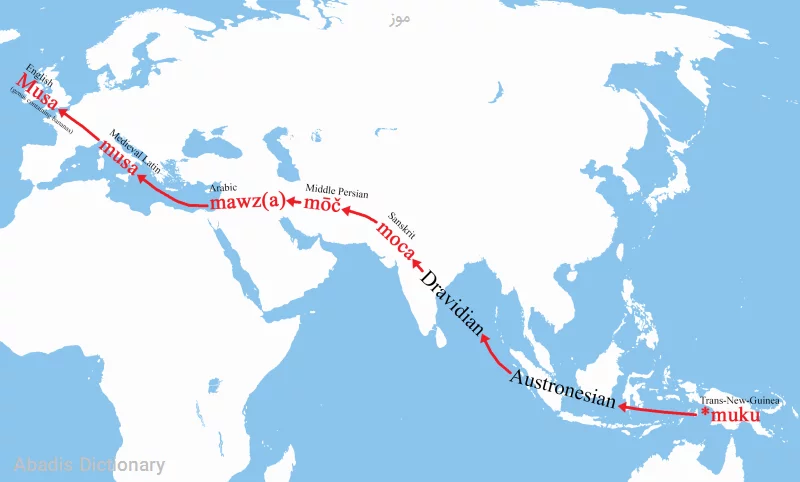
موز، واژه ای پارسی است که همانگونه که کاربر /محمدرضا سلطانی زرندی ( مولف ) / گفتند، "نام علمی" موز ، "musa" دارد ( ! ) که آشکار است که با "موز" پارسی پیوند دارد.
بِدرود!
موز واژه پارسی ست که از پارسی به اربی وارد شده.
موز واژه ای پهلوی است که در پهلوی مووز خوانده میشده و به عربی هم راه یافته.
موز یه واژه ی پارسی است که به زبان اربی رفته و در گویش مردم تاجیکستان به آن بنان گفته میشه
موز : در زبان فارسی به آن بنان ، طللر و طلح گفته می شده در اسم استاد بنان ( خواننده معروف ایرانی ) هم آمده است . واژه ی بنان از فارسی به اروپا رفته و به banana تبدیل شده .
میوه ای دراز، خمیده، و گوشتی که در نواحی گرمسیری به عمل می آید.

